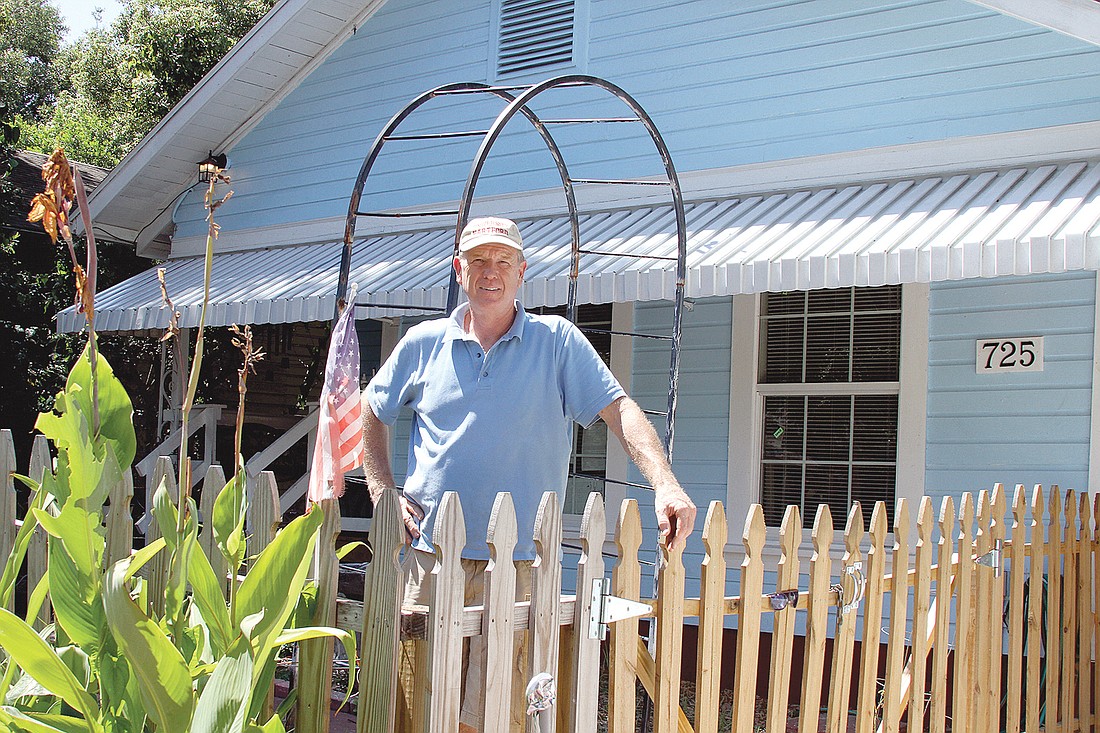
As a Realtor with The Legends of Real Estate East Coast, Paul Gruenther lists and sells properties all around Jacksonville. His office is in Jacksonville Beach, but he works the entire area. The Beaches, Northside, Westside and St. Johns County — new neighborhoods and existing neighborhoods — he knows them all.
That’s his business. But for the past 2½ years, Gruenther has been passionate about a particular neighborhood in Northwest Jacksonville 5 miles north of Downtown, a place where most of the houses were built before World War II.
He lives there. He invests in homes there by buying and rehabbing them. And he has become an advocate for turning the once-proud working class area into the charming enclave he and others believe it has the potential to be.
“There are places in Jacksonville where people perceive there are problems,” he said of the 30-block neighborhood in and around Norwood Avenue, where he lives on Escambia Street. “But there are also opportunities. These problems basically are opportunities.”
Gruenther, who owned five houses in Ponte Vedra Beach before the recession, moved into his Escambia Street home on New Year’s Eve 2015. He bought the 1,050-square-foot house for $13,900 and spent $80,000 renovating it over 10 months.
Built in the 1920s, like many others on the street, the home was structurally sound, but needed to be gutted. The two-bedroom, 2 ½-bath home now has a completely new interior from floor to ceiling.
He co-owns another home in the neighborhood and recently purchased a fixer-upper across the street, his next project.
“I feel like a missionary in the neighborhood,” said Gruenther, who was awarded a HandsOn Jacksonville Award in April for his efforts and more, including his work with Big Brothers Big Sisters of Northeast Florida and voluntarily teaching finance classes in area high schools.
He discovered the neighborhood, and its quaint early 20th-century bungalows when looking for an affordable place to rent. After moving into his rental, he became intrigued with how many houses had been renovated there, the number of new homes built and the amount of rehab potential that remained.
While researching for possible fixer-uppers, Gruenther learned that Grace and Truth Community Development Corp. owned properties there.
When he walked in the door of the nearby Grace and Truth office on North Shore Drive, Bishop E.M. Johnson, the nonprofit’s leader, asked what he was doing there.
“God sent me here,” Gruenther said. It wasn’t long before Johnson asked Gruenther to join the board of directors. Now, the two are close friends.
“Brothers,” Gruenther said, “from another mother.”
The two share the goal of turning abandoned and neglected homes into quality, affordable housing. The neighborhood is still dotted with what Gruenther calls “zombie houses,” places where no one lives and no one pays the property taxes.
He sees them as having the potential to become a family’s dream home. They still have “good bones,” he said, many with original oak floors, millwork, brick fireplaces and front porches.
Johnson, whom everyone calls “Bishop,” founded the CDC in 2001 to address the need for housing as well as social and economic opportunities in the neighborhood. Then as well as now, Johnson said, the greatest need is affordable housing. To date, the CDC has built new homes on 60 lots, where the existing houses are better demolished than renovated. The CDC has also rehabbed and sold some 30 homes to mortgage-ready buyers. “Most single black females with children,” Johnson said of the new owners. “Most were first-generation home buyers.”
The challenge now is that newly constructed houses in the community on average appraise for $125,000, he said. But it costs $175,000 to build them. “The city has been funding the gap, but that money has been drying up gradually,” Johnson said. “The issue now is gap funding, which makes it hard to fulfill our mission.”
Gruenther agrees with Johnson that putting owner families in the houses stabilizes the neighborhood. The homes were originally built for blue-collar workers employed at the nearby former Standard Turpentine Company.
Built 107 years ago, the factory extracted turpentine from pine trees. It is still in operation as a fragrance and specialty chemical plant owned by German company Symrise AG, although most who work there commute from elsewhere.
Norwood Elementary, which has been closed by the Duval County Public Schools, stands vacant. The large brick building, though, remains intact and has the potential for use, such as a senior citizen center.
“This is an established community, but with a lot of opportunity for new construction,” Gruenther said. “All the infrastructure is already here — gas, water and electric. And there are 40 to 50 lots available that are not currently being occupied.”
Gruenther said he believes in paying it forward. “I can live in this neighborhood. I can invest in this neighborhood. And I can do community service,” he said.
It is important to do something for somebody else, he added. Even if a situation appears hopeless or overwhelming.
“You can make a difference in your community,” Gruenther said. “We can totally change this place around. If I can get my neighbors to have a better quality of life, it improves my quality of life, too.”